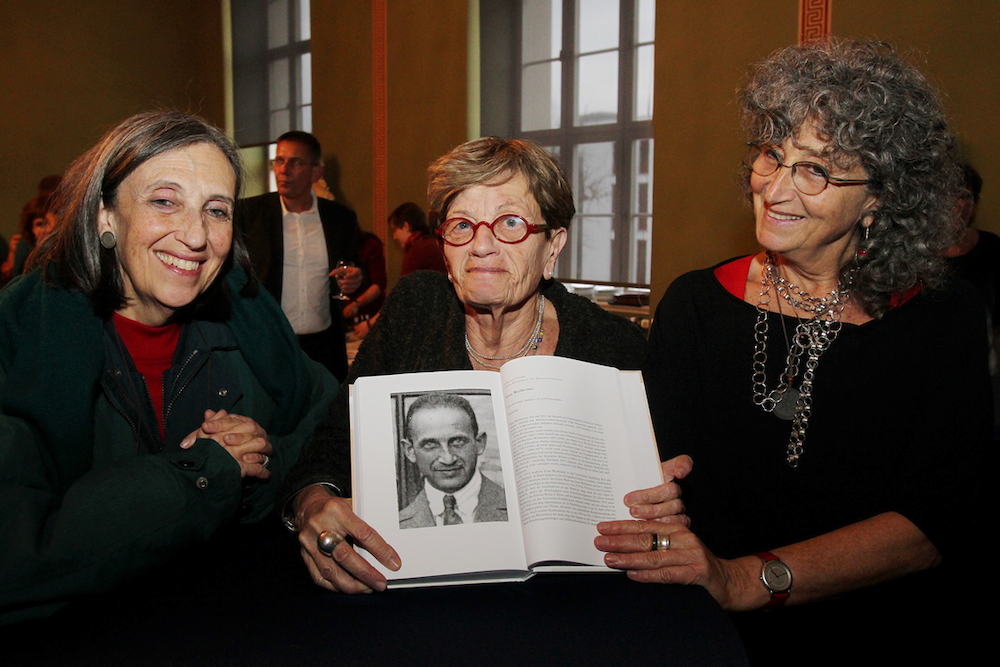An emotional journey to the ancestors

Among those who came were the daughters of the Jewish physician, Ernst Wertheimer, who used to teach in Halle. Ernst Wertheimer was a quiet person. “He never spoke much,” his daughter, Prof. Dr. Ada Goldfarb recalls. He spoke even less about the injustice he experienced in his former hometown. “I am certain that he suffered,” says his daughter. She can only guess why her father remained silent. “I think talking about it would have been too painful for him.”
Ada Goldfarb and her sisters, Prof. Dr. Dorrit Nitzan and Prof. Dr. Ayala Abrahamov, were born in Jerusalem where their father had emigrated in the summer of 1934, a year after the Law for the Restoration of the Professional Civil Service came into effect in Germany and, likewise, at the university in Halle. Like other Jewish or politically undesirable colleagues, he was removed from his university post. Wertheimer, a physician, established a new livelihood in Israel, heading the pathology and chemistry lab of Hadassah Hospital at the then relatively new Hebrew University of Jerusalem. He and his wife Ruth, who was born in Halle, had four daughters.
In the beginning the Wertheimers spoke only a little Hebrew. Evidence of this can still be seen today when talking to his daughters. German still comes easily to their oldest daughter, Ayala, who was born in 1935. Over time Wertheimer’s Hebrew improved with the result that his youngest daughter Dorrit, born in 1947, can understand considerably less of her parents’ native language.
The three women visited Halle for the first time at the end of November. They came at the invitation of the university to take part in an event commemorating professors who were barred from the university between 1933 and 1945. The trip was made possible by financial support from the Saalesparkasse Savings Bank.
Even 80 years on, the horrible events that took place back then evoke many emotions. “The night before the commemoration event I was very unsettled. So much so that I couldn’t fall asleep,” recounts 66-year-old Dorrit Nitzan, adding “it isn’t too late to remember the unjust banishment of the Jewish professors.” Together with her sisters, Dorrit Nitzan went in search of traces of her parents in Halle. They visited their former home in Leipziger Strasse and had a look at their father’s personnel file in the university archives. “Now that we have seen all of these places we feel much closer to our parents.”
The same is true for Waltraud Roesel. Unlike the daughters of Ernst Wertheimer, she didn’t have far to travel. However for her, the journey from her home in Salzgitter, Lower Saxony, to Halle was a journey into the past and a journey to her grandfather. He was Otto Bremer, a well-respected linguist and dialect researcher. His Alma mater has him to thank for its sound archive. He was also dismissed from his university post in 1933 due to his Jewish roots.
His granddaughter Waltraud, now 74, never met her grandfather. “Ever since I began thinking about him and his past in the course of the commemoration event, an image of him has been coming to light,” she says. New details have been cropping up that “bring her grandfather to life”. She has come across photos showing Otto Bremer in his flat in Wittekindstrasse. Celebrating. Together with his students. Waltraud Roesel knows from her mother that Bremer was very funny, liked being around people, and was by no means elitist - statements which are confirmed when looking at these photos. Thus she has been given the chance to accompany him for a short period of his life.
Waltraud Roesel found out late in life about the fate of her grandfather. “My mother spoke a lot about him, but not about the fact that he was persecuted for being Jewish,” says Waltraud Roesel. She was not aware of this until she found an extensive estate when clearing out her parents’ house at the end of the 1990s. “I discovered in a family tree that we had Jewish roots,” she recalls. Her mother Elfriede was studying in Halle during this time but, because of her Jewish ancestry, wasn’t permitted to do a traineeship.
“Today I am very sad that I was never able to speak with her about all these things,” says Waltraud Roesel. She is all the more grateful for the opportunity to commemorate him which she has been given through the project “Excluded – Commemorating Professors Dismissed Between 1933 and 1945” and the related event in November. Together with a linguist from Halle, Prof. Hans-Joachim Solms, she was able to look into her grandfather’s story for the commemorative paper and has provided many documents for it. This has made her feel closer to her grandfather than she ever thought possible. “I’m glad that this project exists. It has brought me closer to my grandpa.”
John Rothman, son of physicist Hans Rothman, writes about his experience traveling to Germany and speaking at the ceremony at "J. the Jewish news weekly of Northern California".


